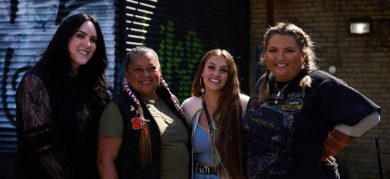
Left to right: Charlie Wall-Andrews, Kim Wheatley, Ila Barker, Nimkish
The SOCAN Foundation was pleased and proud to hold its first-ever Indigenous Song Camp, at the downtown Tkaronto/Toronto creative hub Kilometre House, Sept. 19-22, 2022, during the inaugural edition of Song & Score Week.
Over the course of a four-day creative journey, 18 Indigenous and non-Indigenous songwriters, artists, and producers came together to explore new writing styles, develop new working relationships, and create a positive community experience. Organized by Alan Greyeyes and the sākihiwē festival, the camp allowed participants to expand their networks, while creating new songs in an inspiring setting, and presenting their work at an industry listening session.
Greyeyes, SOCAN Foundation Executive Director Charlie Wall-Andrews, and Rodney Murphy of Kilometre Music Group had planned the camp to take place in 2019 or 2020, but it was postponed due to health restrictions imposed to cope with the pandemic. “It was magical to finally see it made possible,” said Wall-Andrews.
The selected participants came from across the country, and represented a wide variety of musical styles. This cohort included:
- Sunsetto
- Prado
- Angel Baribeau
- Josh Q
- Aysanabee
- Sebastian Gaskin
- Nimkish
- Ila Barker
- Ruby Waters
- Twigg
- Nate Kreiswirth
- Brandon Leger
- TJ Whitelaw
- Mido
- Eli Brown
- Harper Gordon
- Chris LaRocca
“Attending the Indigenous Song Camp was such an uplifting experience,” said Ila Barker. “I genuinely felt like I left that camp a different person, a different artist. It pushed me outside of my comfort zone as a writer, taught me a lot about my abilities, and helped me set new goals. I’m leaving the experience feeling super-crystal-clear on the direction I’ll be taking my art in the future, with a few more songs in my catalogue, and with many lifelong friendships.”
“I feel like we spend a lot of time on business training for Indigenous artists in Canada and not enough on strengthening the art, which is the real driving force behind careers in the music industry,” says Aklan Greyeyes. “I’m super-excited to see what this group does next, because they’re definitely connected to more talent and motivation now.”
The song camp was presented by RBC Emerging Artists, in partnership with the City of Toronto, the SOCAN Foundation, the Canadian Songwriters Hall of Fame, and the sākihiwē Festival. Special Thanks to Kim Wheatley, Anishinaabe Ojibway Grandmother from the Shawanaga First Nations Reserve, who agreed to perform a smudge ceremony to open the camp.